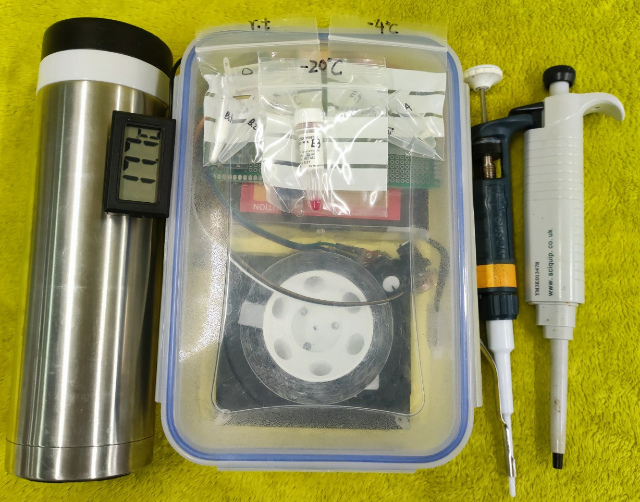

Researchers at Queen Mary University of London have created a low-cost, portable COVID testing kit intended for use in remote, low-resource regions of the world. They describe the approach as a lab-in-a-backpack, and it makes use of a recycled computer hard-drive as a centrifuge. The test assay relies on loop mediated isothermal amplification (LAMP) rather than PCR, and costs just $51 to produce. Using a LAMP assay means that the test does not require thermal cycling, unlike PCR, meaning that the required equipment is much simpler.
The pandemic continues, and with the high transmissibility of the Omicron variant many more people will get COVID-19. Testing services have been stretched to their limit in developed countries, but what happens in remote and low-resource regions? In many such places, getting access to a COVID test is very difficult, particularly gold-standard PCR tests which typically require bulky and expensive lab equipment. This makes it next to impossible to track the spread of the virus, and implement basic public health measures to curb transmission.
To address this, researchers are developing low-cost, portable testing options that can still deliver high sensitivity and accuracy. This latest testing technology is based on a LAMP assay, which requires an incubation step at just one high temperature, rather than the repeated temperature cycles required to amplify viral DNA in a conventional PCR assay. This means that the required equipment is less complex, smaller, and cheaper.
Another bonus with the LAMP approach is that it works with saliva samples, rather than the invasive nasal swabs required for PCR. The researchers showed some ingenuity in the inexpensive equipment they used, and deployed recycled computer components to create a small centrifuge with which to perform the LAMP assay.
“We are excited for the potential of this mobile lab to do COVID-19 tests and the possibility to democratize access to inexpensive testing technology. It is made possible by our philosophy of creating low-cost instruments whenever possible from advances in electronics, or existing instruments,” said Stoyan Smoukov one of the developers of the new testing kit. “Reuse is a high value option for energy and materials sustainability, and we are glad that rather than exporting electronics waste to developing countries, we can export ways to empower people and turn waste computer hard drives into a centrifuge. The COVID-19 test is a timely application, but we also believe with this CentriDrive kit people could perform a large array of routine blood and urine tests, providing a centrifuge away from central hospital facilities.”
more recommended stories
 Phage Therapy Study Reveals RNA-Based Infection Control
Phage Therapy Study Reveals RNA-Based Infection ControlKey Takeaways (Quick Summary) Researchers uncovered.
 Safer Allogeneic Stem Cell Transplants with Treg Therapy
Safer Allogeneic Stem Cell Transplants with Treg TherapyA new preclinical study from the.
 AI in Emergency Medicine and Clinician Decision Accuracy
AI in Emergency Medicine and Clinician Decision AccuracyEmergency teams rely on rapid, accurate.
 Innovative AI Boosts Epilepsy Seizure Prediction by 44%
Innovative AI Boosts Epilepsy Seizure Prediction by 44%Transforming Seizure Prediction in Epilepsy Seizure.
 Hypnosis Boosts NIV Tolerance in Respiratory Failure
Hypnosis Boosts NIV Tolerance in Respiratory FailureA New Approach: Hypnosis Improves NIV.
 Bee-Sting Microneedle Patch for Painless Drug Delivery
Bee-Sting Microneedle Patch for Painless Drug DeliveryMicroneedle Patch: A Pain-Free Alternative for.
 AI Reshapes Anticoagulation in Atrial Fibrillation Care
AI Reshapes Anticoagulation in Atrial Fibrillation CareUnderstanding the Challenge of Atrial Fibrillation.
 Hemoglobin as Brain Antioxidant in Neurodegenerative Disease
Hemoglobin as Brain Antioxidant in Neurodegenerative DiseaseUncovering the Brain’s Own Defense Against.
 Global Data Resource for Progressive MS Research (Multiple Sclerosis)
Global Data Resource for Progressive MS Research (Multiple Sclerosis)The International Progressive MS Alliance has.
 AI Diabetes Risk Detection: Early T2D Prediction
AI Diabetes Risk Detection: Early T2D PredictionA new frontier in early diabetes.

Leave a Comment